
Image: Fahroni, via Shutterstock
Consortium to include 16 pharmaceutical companies and five government agencies
The National Institutes of Health has announced it is setting up an international public-private research consortium to accelerate the development of vaccines and treatments for Covid-19.
The Accelerating Covid-19 Therapeutic Interventions and Vaccines (Activ) partnership will primarily focus on cooperation between companies during the early stages of vaccine development, such as jointly picking the strongest vaccine candidates and sharing protocols for vaccine testing.
Government agencies will use their existing networks to speed clinical trials, the NIH said in a press release on 17 April.
The public bodies involved are the NIH, the US health department, the Food and Drug Administration, the Centres of Disease Control and Prevention and the European Medicines Agency.
They will work with the NIH’s own charitable foundation and 16 mostly US-based pharmaceutical companies. Most of the non-US companies are based in Europe, with Japan’s Takeda the only Asian drug maker on board.
“Battling the Covid-19 pandemic is far too great a challenge for any one company or institution to solve alone,” said Mikael Dolsten, chief scientific officer at drug maker Pfizer, one of the US-based companies on board. “We are seeing an unprecedented level of collaboration across the innovation ecosystem.”
US health secretary Alex Azar said the NIH “has an extensive track record of coordinating these development efforts for new biological threats, and they are well-suited to lead this”.
“Using the most advanced clinical trial methods to rapidly test multiple interventions will help get the answers we need as soon as possible,” said FDA head Stephen Hahn. The partnership will compare multiple candidate drugs against one group of patients receiving a placebo to maximise efficiency, the NIH said.
A few days before the NIH announcement, the drug makers Sanofi and GSK said they would work together on a potential vaccine that combines proprietary technologies from each company. The vaccine candidate, which is expected to begin trials in the autumn of 2020, uses a genetically engineered replica of a coronavirus protein attached to a distantly related virus that usually infects insects.
The announcement of the NIH-backed public-private partnership follows the first results from the agency’s animal trials of potential coronavirus treatments and vaccines.
One potential vaccine, which uses a weakened virus to deliver proteins from the coronavirus that causes Middle East Respiratory Syndrome, has been shown to protect mice against six strains of that disease, which emerged in Saudi Arabia in 2012. The MERS coronavirus is closely related to SARS-Cov-2, which causes Covid-19, and researchers are already exploring whether the same weakened virus can be used in a similar way to create immunity against Covid-19.
Another NIH-backed trial found that the anti-viral drug Remdesivir, first developed to treat the Ebola and Marburg viruses, reduced lung damage in monkeys infected with SARS-CoV-2.
The hopeful reports, which have been published on preprint servers and so are not yet peer reviewed, came as an NIH panel cautioned against rushing to conclusions on Covid-19 treatments, as little data have so far been collected.
“At present, no drug has been proven to be safe and effective for treating Covid-19,” the panel of NIH experts said.